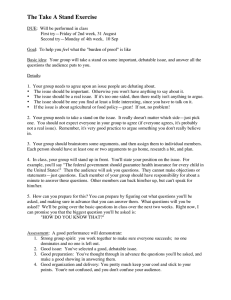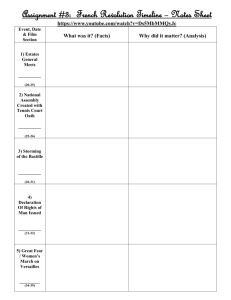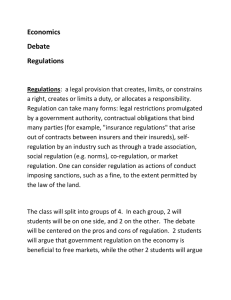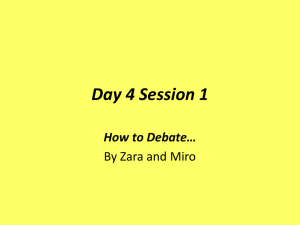Sp Com 322 Prof. Jean Goodwin
advertisement
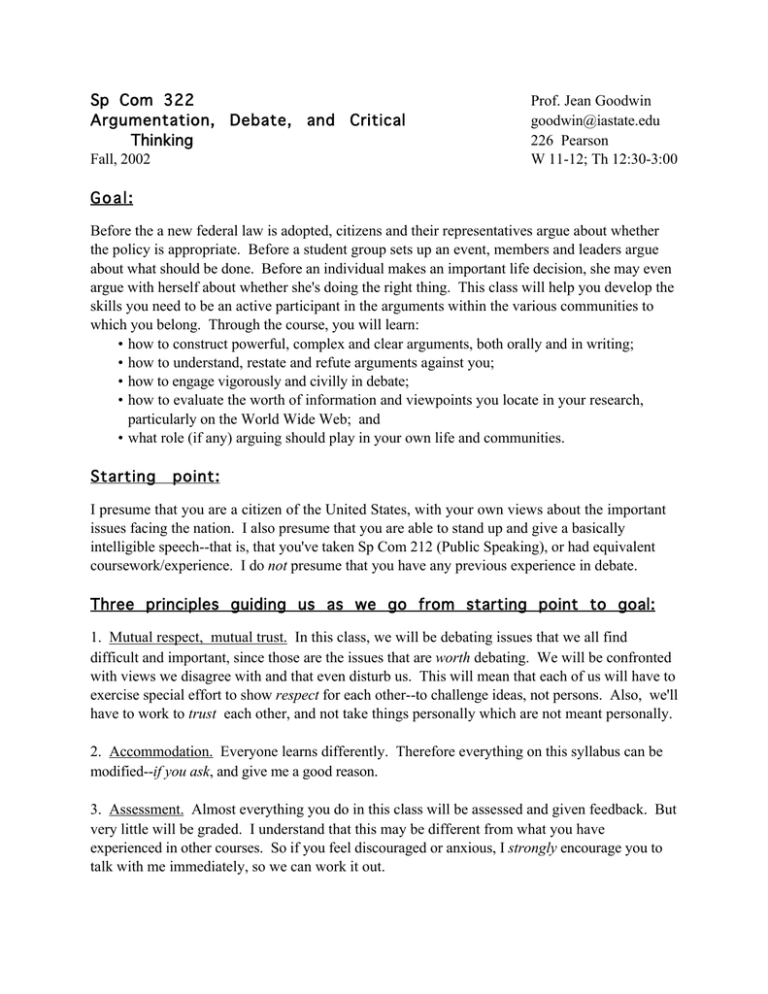
Sp Com 322 Argumentation, Thinking Fall, 2002 Debate, and Critical Prof. Jean Goodwin goodwin@iastate.edu 226 Pearson W 11-12; Th 12:30-3:00 Goal: Before the a new federal law is adopted, citizens and their representatives argue about whether the policy is appropriate. Before a student group sets up an event, members and leaders argue about what should be done. Before an individual makes an important life decision, she may even argue with herself about whether she's doing the right thing. This class will help you develop the skills you need to be an active participant in the arguments within the various communities to which you belong. Through the course, you will learn: • how to construct powerful, complex and clear arguments, both orally and in writing; • how to understand, restate and refute arguments against you; • how to engage vigorously and civilly in debate; • how to evaluate the worth of information and viewpoints you locate in your research, particularly on the World Wide Web; and • what role (if any) arguing should play in your own life and communities. Starting point: I presume that you are a citizen of the United States, with your own views about the important issues facing the nation. I also presume that you are able to stand up and give a basically intelligible speech--that is, that you've taken Sp Com 212 (Public Speaking), or had equivalent coursework/experience. I do not presume that you have any previous experience in debate. Three principles guiding us as we go from starting point to goal: 1. Mutual respect, mutual trust. In this class, we will be debating issues that we all find difficult and important, since those are the issues that are worth debating. We will be confronted with views we disagree with and that even disturb us. This will mean that each of us will have to exercise special effort to show respect for each other--to challenge ideas, not persons. Also, we'll have to work to trust each other, and not take things personally which are not meant personally. 2. Accommodation. Everyone learns differently. Therefore everything on this syllabus can be modified--if you ask, and give me a good reason. 3. Assessment. Almost everything you do in this class will be assessed and given feedback. But very little will be graded. I understand that this may be different from what you have experienced in other courses. So if you feel discouraged or anxious, I strongly encourage you to talk with me immediately, so we can work it out. General overview of the path between starting point and goal: Weeks 1 & 2 Weeks 2-6 Weeks 7-13 Weeks 14 & 15 Why argue? Debating questions of value: the rights & wrongs of the war against terrorism. Graded work: position paper. Debating questions of policy: what should we do in response to 9/11? Graded work: exam and debate. Panel debates in the community, final evaluations, optional final exam, paper, tutorial. Resources for getting from here to there: 1. Class time. For the first two-thirds of the course, each week will have a regular pattern: Tuesdays will be "practice" days. Almost every Tuesday, a short (1-2 page) argument will be due; in class, you'll have a chance to peer review another student's paper and to selfassess your own. Also, some or all of you will debate the topic of the day. And after the debate, we'll pause to assess it. Thursdays will be "understanding" days. Almost every Thursday will start with a ten minute quiz testing basic knowledge about the reading for the week. Then the argument topic for the following week will be introduced. The rest of the session will be devoted to "lecturette" and exercises to help you understand the concepts we'll be practicing. 2. Peer group. In the second week, you'll be assigned to the small (4-6 person), diverse group that you'll work with for the rest of the term. Although all grades will be based on your own individual performance, your group will give you a chance to share work, help each other learn, practice skills and maybe even have fun in and out of class. If you are thoroughly convinced that group work is not appropriate for you, contact me immediately via email and (if you convince me, too) we'll try to work out an accommodation. 3. The instructor. It's best to contact me by email (goodwin@iastate.edu). My regular office hours are Wed. 11-12, Th 12:30-3:00; I'll also be available by appointment. 4. Readings. Four books (available at the University Book Store) are our basic readings: Weston, Rulebook for Arguments; Alexander & Tate, Web Wisdom; Bennett, Why We Fight; Williams, Writing in the Dust. Other readings will be handed out or put online. 5. The course website, linked from <http://www.public.iastate.edu/~goodwin/homepage.html>, will contain some readings and copies of all handouts. 6. Your fellow students, the ISU community, and the rest of your life. Expectations: In line with the general policy for college courses, you should expect to spend on the average of 2-3 hours out of class for every hour in class--i.e., about 5-7 hours per week. Some of this time will be spent reading, but more will be working alone or with your group to prepare arguments. There will be three major graded assignments: -A position paper (about 5 pages) on the proper response to 9/11 -A short-answer exam on the course concepts -An oral debate (about 5 min. per person) on a policy issue related to 9/11 You can make up or re-do any of these during finals week--handing in a revised paper, taking another exam, or debating your topic with me in a tutorial. Only the higher grade will count. There will be numerous activities given feedback and assessed on a "check/zero" (adequate/inadequate or none) basis, including: -weekly (Tuesday) papers--about 8 -weekly (Thursday) quizzes--about 9 -in-class practice debates--about 1 -in-class short essays--about 2 -research progress reports--about 2 -a panel debate before an outside audience--1 These activities will only be assessed if they are handed in or performed on the date they are due. In other words: no late work will be accepted. You can, however, undertake "extra credit" work in order to earn additional "checks." Come to me with a proposal about something that will help you learn; and here are two examples: -Visit my office hours in the first four weeks and tell me about yourself for ten minutes. -Get a letter to the editor published during the term and give me a copy. Grading: Your final grade in this class will be based both on your performance on the major graded activities and on your record of participation in the ungraded activities. To earn a: A B C D you will need an average on the graded assignments of: A B C D AND adequate completion of this many ungraded activities: 90% 83% 73% 63% In addition, your final grade will be raised, left the same or lowered one step (e.g., B to B+) based on the quality of the final self-assessment due during finals week, AND your grade will be lowered one step if you are absent the last day of class.

